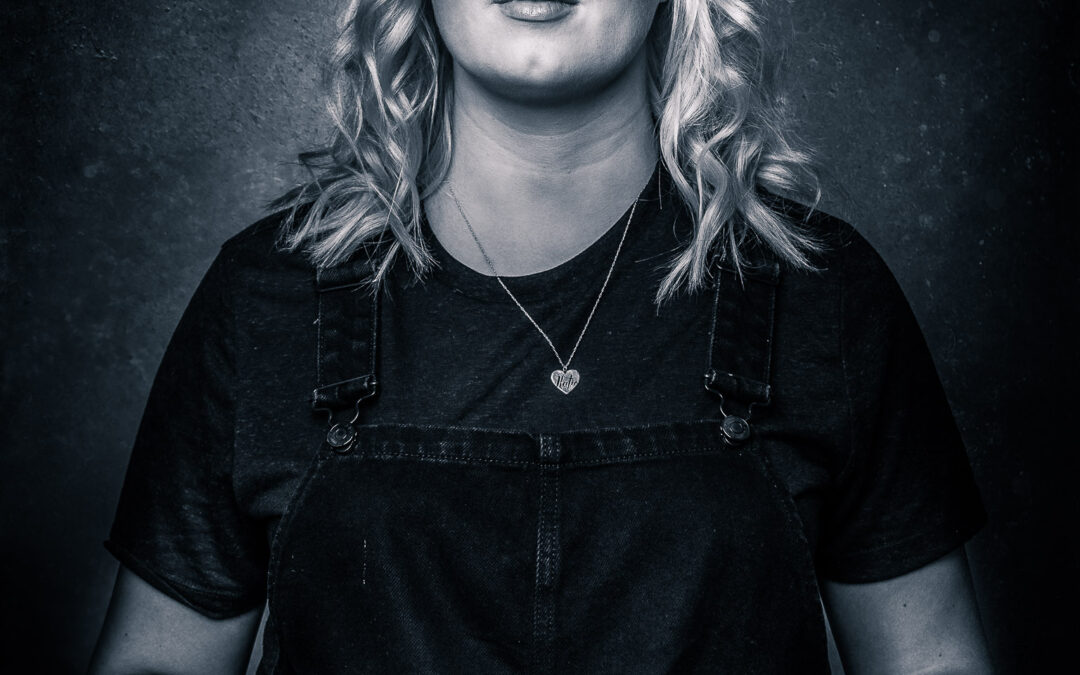
Katie is one of those people who, on the surface, look like they have it all. She’s young, beautiful and famous. But just before the exhibition in 2018 she published a book detailing her battles with mental health and offering advice to young people on how to help theirs. She has also presented a series of BBC documentaries on the subject. So I was delighted when she agreed to take part in the Open Shutters project.
Here, in her own words, is Katie Thistleton’s story:
“I’m a journalist and presenter: I present a show called Life Hacks on BBC Radio 1 which is all about young people’s issues, and I also present for CBBC. I do CBBC HQ, which is the modern day version of the broom cupboard! I’ve worked in various jobs at the BBC and also used to work for an NHS mental health trust – Pennine Care – in the office. I’m an advocate for mental health awareness and work with charities such as PLACE2BE and YoungMinds regularly, I’ve also written a book called ‘Dear Katie’ for 10-16 year olds. It’s an agony aunt style book with problem letters from real young people and advice from myself, a doctor and a child psychotherapist.
I have always been very anxious but for a long time didn’t really know how to put into words how I felt, and I certainly wasn’t aware that it was something you could treat as an illness, rather than a personality flaw. A few years ago my anxiety and hectic lifestyle led to me having a bit of a breakdown where I had to accept I was feeling quite depressed. Medication and counselling both hugely helped me and I still struggle now – particularly when I’m overworked and not looking after myself properly. But now I can spot the signs and prioritise self care.
I honestly think I displayed symptoms of anxiety as a really young child – I used to feel like I was struggling to breathe, and my parents would wonder if it was allergies. It was only when aged 19 I was experiencing the same feelings that a doctor diagnosed me with panic disorder and I realised I’d had bouts of it all my life. Even as a baby my mum said I always had clammy hands which is an anxiety symptom I’ve carried through life!
Feeling depressed made me appreciate all the little things in life once I got better, and made me focus on the only things that matter to me – the things that make me feel good. Before that I was always trying to be someone else, always trying to find a purpose. I realised after being depressed that I already had a purpose and an identity, and I didn’t have to try so hard to get one. I also think people are more likely to ask me for help now I’ve spoken out, which I’m glad about. I want my nieces and nephews and friends and family to be able to talk to me about anything. I think speaking out about mental illness is so freeing – you feel like you don’t have to try so hard to pretend everything is OK once you do.
My advice? Write a list of all the things that really matter to you, and make you feel good, the big and the small, and take the pressure off yourself. Do less of what you don’t want to do and more of what you do. Don’t be afraid to try counselling or anti depressants – neither are anything to be ashamed of and might change your life.
I chose to have my photo taken with my anti-depressants because they really were life changing for me. When I was depressed I felt I was underground, in the dark and unable to motivate myself to do any of the things I needed to do to feel better. The anti-depressants, even though they made me feel worse for the first few days or so, picked me up and put me on level ground, so I could begin to do things I needed to do to make my life easier – exercise, say no to things I didn’t want to do, read books, see friends and family. They took away the negative fog so I no longer thought I was the most worthless person in the world. I’m happy to be taking them, and will forever if I need to, and I can.”

